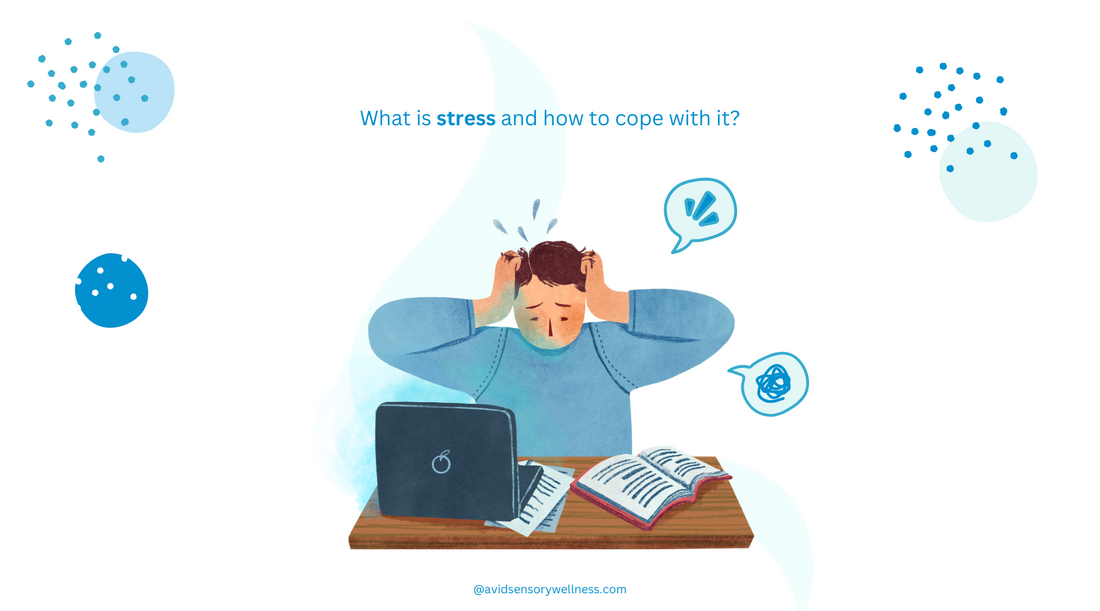What is stress?
Stress is a normal reaction the body has when changes or challenges occur (stressors), resulting in physical, emotional and intellectual responses.
Stress triggers your fight-or-flight response in order to fight the stressor or run away from it. After the response occurs, your body should relax.[1]

Not all stress is bad
Stress can be healthy when it helps you avoid an accident or meet a tight deadline, keeping in mind that stress feels different to each person.
If stress becomes frequent, severe, and prolonged, it becomes unhealthy.[2]
What are the types of stress?
- Physical stress
- Psychological stress
- Psychosocial stress
- Psychospiritual stress [3]
Stress stages
- The alarm stage > Fight-or-flight response.
- The resistance stage > Recovery while on high alert.
- The exhaustion stage > 1 & 2 are active for a long time and diseases may begin. [4]
Some ways to lower your stress level?
- Healthy nutrition,
- Sleeping well,
- Deep breathing, meditation, mindfulness, yoga,
- Exercise,
- Journaling or meeting and talking to a trusted friend, partner or therapist. [5]

5 ways to counter stress and achieve a lot of tasks in a short time
Coping with stress can be a daunting task in itself, but when you add a long list of tasks to complete, it can feel overwhelming.
Here are 5 ways to do lots of tasks in a short time to cope with stress:
- Prioritize your tasks: Make a list of all the tasks you need to complete and prioritize them based on how urgent and important they are. This will help you focus your energy on the most critical tasks first, which can help reduce stress levels.
- Use the Pomodoro Technique: This method involves breaking up your tasks into 25-minute intervals with short breaks in between. This time management technique can help you stay focused and motivated while completing tasks quickly.
- Delegate tasks: If you have too many tasks to complete, consider delegating some of them to other people. This can help you free up time and reduce your workload, which can be useful in reducing stress levels.
- Avoid multitasking: Research has shown that multitasking can actually decrease productivity and increase stress levels. Instead, focus your energy on one task at a time, and you'll be surprised at how much more you can accomplish in a short amount of time.
- Take breaks: It may seem counterintuitive, but taking regular breaks can actually help you complete tasks more quickly. Breaks can help you recharge your energy levels, reduce stress, and increase your focus when you return to the task at hand. [6]

Learn more sensory facts on our social pages @avid sensory wellness or @avidsensorywellness
If you have any questions please feel free to reach out to us here or email us at avidsensorywellness@gmail.com
Sources
[1] www.Clevelandclinic.org
[2] www.Healthline.com
[3]www.Mentalhelp.net
[3]www.Ptsd.va.gov
[3]www.Nimh.nih.gov
[4] www.Cambridge.org
[5] www.Marathon-health.com
[6] https://www.mindtools.com/pages/article/newHTE_94.htm
[6] https://francescocirillo.com/pages/pomodoro-technique
[6]https://www.forbes.com/sites/ashleystahl/2020/02/18/5-ways-to-delegate-tasks-effectively/?sh=5c05a05f7205
[6]https://www.psychologytoday.com/us/blog/brain-babble/201301/the-myth-multitasking
[6]https://www.fastcompany.com/90245397/why-taking-breaks-is-key-to-productivity

